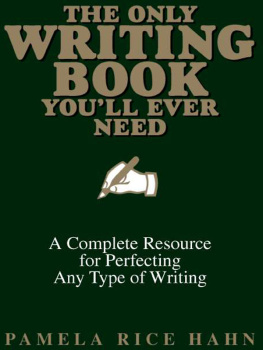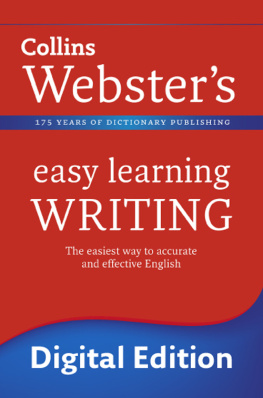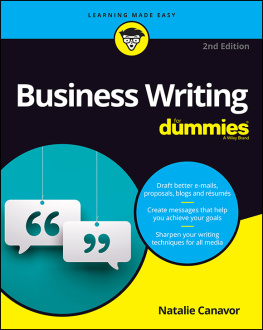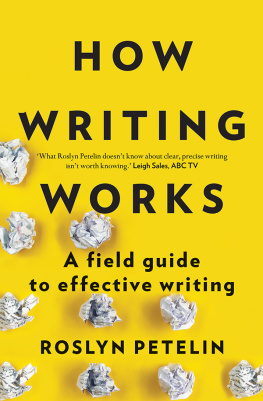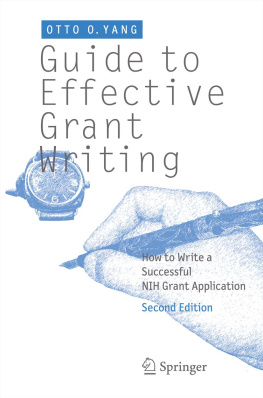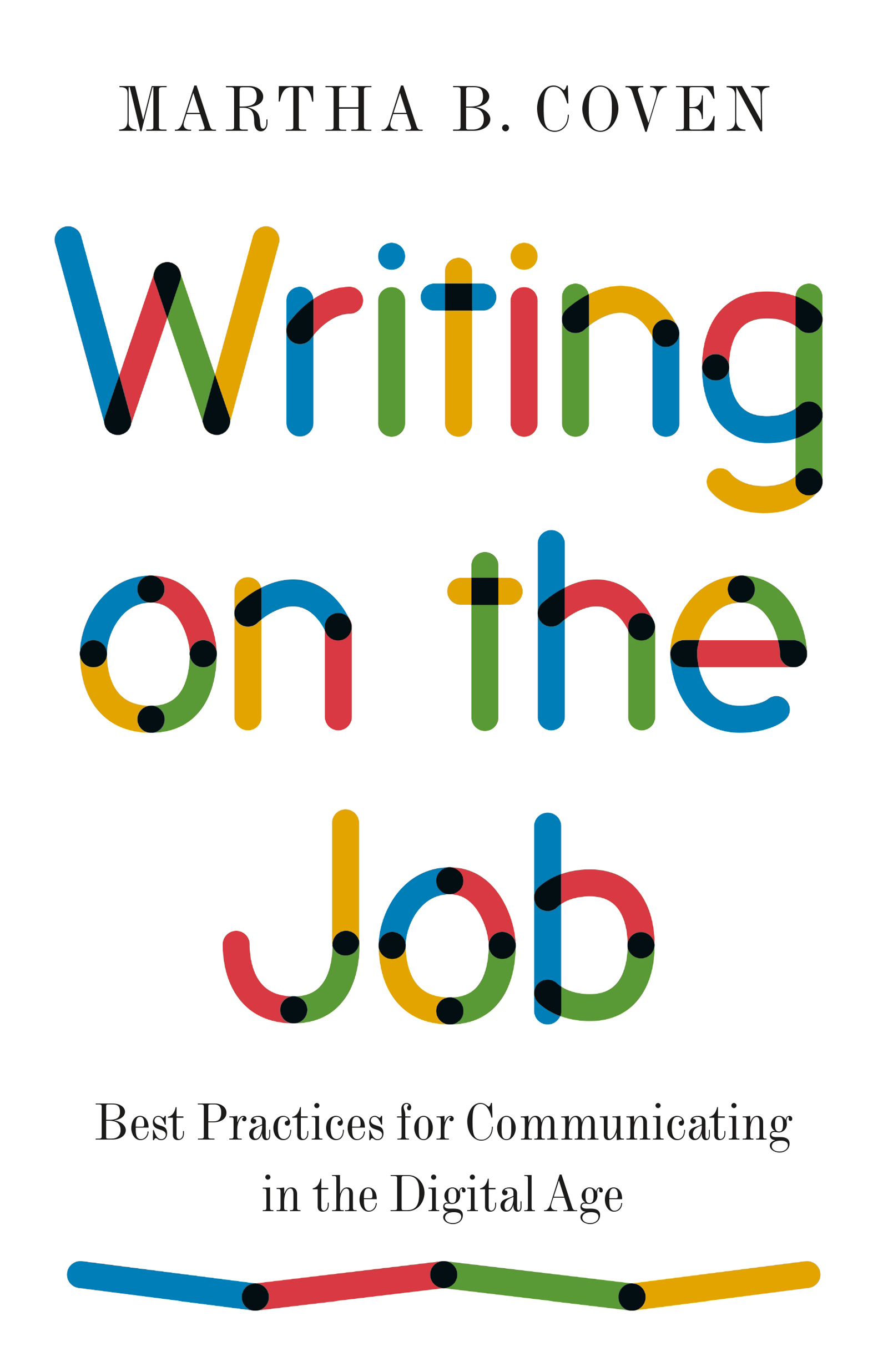PRAISE FORWRITING ON THE JOB
Every page of this slim volume has a wealth of real-world experience distilled into actionable and sage advice. Note to those early in their careersdo yourself a favor and read this book now and carefully. It will return that modest investment several times over.
Ashvin B. Chhabra, author of The Aspirational Investor: Taming the Markets to Achieve Your Lifes Goals
Communicating clearly and confidently is an essential career skill. Writing on the Job is a concise, accessible guide to business writing in todays workplace.
Margaret Steen, UC Berkeley Extension business writing instructor
Martha Coven delivers a concise, thoughtful book that provides useful learning for a lifetime. She demonstrates how to write with clarity and liveliness, all the while illuminating why it is important for connecting with your audience. Essential for young professionals and seasoned writers alike.
Myles C. Thompson, founding publisher of Columbia Business School Publishing
Ideas are the lifeblood of enterprise, but they only matter if communicated effectively. In this brief book, Martha Coven exemplifies this lesson by explaining how to write clearly and compellingly across all of todays forms of communication, from emails and memos to speeches and slide decks. The result is an elements of professional style for the twenty-first century.
Donald H. Chew, editor of the Journal of Applied Corporate Finance
Concise and compelling communication has never been more crucial in the noisy digital age. Taking audience, messaging, and industry expectations into account, Writing on the Job provides expert advice intertwined with practical examples for professionals across all experience levels to thrive as more effective communicators.
Rimjhim Dey, founder and owner of DEY.Ideas + Influence
WRITING ON THE
WRITING ON THE JOB
BEST PRACTICES FOR COMMUNICATING IN THE DIGITAL AGE
MARTHA B. COVEN
PRINCETON UNIVERSITY PRESS
PRINCETON AND OXFORD
Copyright 2022 by Princeton University Press
Princeton University Press is committed to the protection of copyright and the intellectual property our authors entrust to us. Copyright promotes the progress and integrity of knowledge. Thank you for supporting free speech and the global exchange of ideas by purchasing an authorized edition of this book. If you wish to reproduce or distribute any part of it in any form, please obtain permission.
Requests for permission to reproduce material from this work should be sent to
Published by Princeton University Press
41 William Street, Princeton, New Jersey 08540
6 Oxford Street, Woodstock, Oxfordshire OX20 1TR
press.princeton.edu
All Rights Reserved
Library of Congress Cataloging-in-Publication Data
Names: Coven, Martha B., 1972 author.
Title: Writing on the job : best practices for communicating in the digital age / Martha B. Coven, Princeton University Press.
Description: Princeton, NJ : Princeton University Press, [2022] | Includes bibliographical references and index.
Identifiers: LCCN 2021042258 (print) | LCCN 2021042259 (ebook) | ISBN 9780691229959 (paperback) | ISBN 9780691229966 (ebook)
Subjects: LCSH: Business writing. | Business communication.
Classification: LCC HF5718.5 .C69 2022 (print) | LCC HF5718.5 (ebook) | DDC 808.06/6658dc23/eng/20211103
LC record available at https://lccn.loc.gov/2021042258
LC ebook record available at https://lccn.loc.gov/2021042259
Version 1.0
British Library Cataloging-in-Publication Data is available
Editorial: Peter Dougherty and Alena Chekanov
Production Editorial: Kathleen Cioffi
Text Design: Carmina Alvarez
Cover Design: Karl Spurzem
Production: Erin Suydam
Publicity: Maria Whelan and Kathryn Stevens
Copyeditor: Jennifer McClain
To the friends, family, students, and colleagues to whom I confessed the dream of writing this book. You know who you are, and Im grateful to each of you for your support.
Contents
WRITING ON THE JOB
Introduction
Writing is an essential skill in todays economy. We rely on words more than ever in the digital-age workplace, on messaging platforms and social media as well as in classic forms like memos and reports. And given how much reading is done on mobile devices, being able to write succinctly is critical to workplace success.
Clear and direct languagefree of needless words and jargonimproves communication within an organization and supports informed decision-making. People who write well on the job are more effective at carrying out their organizations mission and more likely to advance professionally.
The primary audience for this book is professionals in the first decade of their careers, whether in the corporate world, at a nonprofit organization, or in the public sector. If you are one of these people, you may still be developing the skill of writing an effective email communication, a persuasive memo, or a compelling slide deck. If you struggle with the fundamentals of writing, you may not be ready for this book. But if you can string together sentences and are looking for ideas on how to make your writing more accessible and powerful, Writing on the Job is for you.
This book will also be useful to people further along in their careers who find themselves with new responsibilitiesor new communications platformsto navigate. For example, the book explains how to write for social media and advises on tasks assigned to managers and executives, such as providing critical feedback through performance reviews or delivering a speech.
This book draws on my own experiences writing on the job for more than twenty-five years, in the White House and on Capitol Hill as well as in the private sector. It also relies on techniques Ive developed in the classroom at Princeton University, where I train young professionals to write clearly and effectively. The book begins with the basics: how to develop a professional style, get started on a piece of writing, create a first draft, and edit it into a strong final product. It then offers advice on more than a dozen forms of writing, from a one-line tweet to a lengthy report, using concrete examples and templates. The book also provides guidance on how formal or informal to allow your language to be, and how to strike the right tone so your message gets heard. Throughout, it emphasizes the bottom line up front approach used by the US military to ensure efficient communications.
The goal is to help you write effectively on the joband enjoy doing it!
The Basics
Developing a Professional Style
Writing on the job is different from texting or emailing friends and family, but its not as different as you might imagine. Your writing will be more readable and enjoyable if you apply the natural voice you bring to personal communications. Your goal should be to sound lively, not stuffy. Writing in a professional style also involves being smart about how you use the page or screen, including by relying on formatting tools like bullets and bold print. If most of your reading consists of fiction or lengthy technical articles, which rarely use these tools, you may need to broaden your notion of what good writing looks like. Most importantly, good professional writing requires that you adjust to your audience. If you are coming from a school setting, your writing may have taken the form of a brain dump, where your goal was simply to demonstrate your mastery of a subject to an instructor. Or you may be in the habit of expressing yourself creatively, without a particular audience in mind. In the workplace, theres always an audience. Before beginning any writing task, its critical to consider who they are, what they know, and what they care about.


